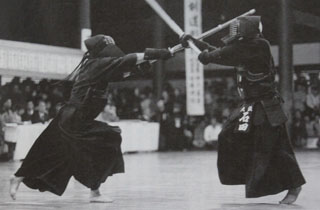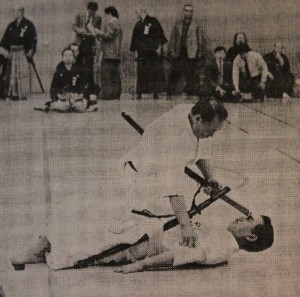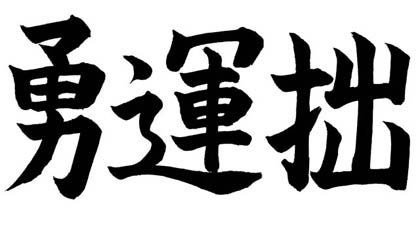Consider defeat …
 “In Iaido we always win against enemies” performing a kata slowly or quickly, result is the same … We win. Of course we are alone fighting against imaginary opponents and the scenario (Riai) says we win. How could we loose ? I did not deeply thought about this but writing it down suddenly gave me a strange feeling. Why should we be so sure (reassured) of the encounter result if we really live the kata, if we really live in the moment ?
“In Iaido we always win against enemies” performing a kata slowly or quickly, result is the same … We win. Of course we are alone fighting against imaginary opponents and the scenario (Riai) says we win. How could we loose ? I did not deeply thought about this but writing it down suddenly gave me a strange feeling. Why should we be so sure (reassured) of the encounter result if we really live the kata, if we really live in the moment ?
So I was thinking broaching the practice via a different angle, to put it another way let’s change the postulate into “In iaido we may loose against enemies” … Well do you mean that if I do not perform the kata correctly I may die -> Yes, if my seme is not dense enough, the enemy will see a suki and … -> yes, if my timing is not good the enemy will seize the opportunity to kill me -> Yes, if my nukitsuke/kiritsuke are not correct (hasuji) and strong enough to cut my enemy for good he will escape, survive, respond -> Yes … Yes that is what I mean, we loose if forms are not performed correctly. Doesn’t it slightly change perception of the kata ? We should not be so sure of the result of the encounter and give each time 110%, sutemi, even if we know the scenario and that the scenario/riai tell us the end of the story. “Warning: Spoiler!!!” like it is said for movie reviews.
 In kendo, fighting against a real opponent, each match is unique and you have to build your attack, take care of your kamae, keep your kissaki alive without suki, use your (ki)seme, feel the enemy’s rhythm and attack at the right moment. Well easier to write down than do and even harder to render when like in Iaido there is no real opponent in front of you. Iaido should reflect these interactions with the opponent even if not real, we also have to build our actions in reaction to the riai and the kasso teki movements, ensuring that our first cut is good enough to break into the enemy’s rhythm/attack/defence and that the finishing cut is a todome “coup de grace”.
In kendo, fighting against a real opponent, each match is unique and you have to build your attack, take care of your kamae, keep your kissaki alive without suki, use your (ki)seme, feel the enemy’s rhythm and attack at the right moment. Well easier to write down than do and even harder to render when like in Iaido there is no real opponent in front of you. Iaido should reflect these interactions with the opponent even if not real, we also have to build our actions in reaction to the riai and the kasso teki movements, ensuring that our first cut is good enough to break into the enemy’s rhythm/attack/defence and that the finishing cut is a todome “coup de grace”.
While getting deeper into the study of Iaido, trying to adsorb our shishō Oda sensei’s and other sensei teachings and slowly mastering some of the technical aspects. Teachings are getting more and more focused on the crucial point of respecting the Riai (Inner story of each kata) and working on it as a Budo. Of course you need strong technical bases in order to efficiently use your body and your katana and you need to practice those every day in order to maintain it to the proper level linked to your grade. But from a certain point you need to instil life in your kata, living the riai.
 Make no mistake about the above reflection. Iaido is not only about fighting and winning, using techniques to defend yourself and kill enemies. Iaido contains “Do” which implies very important philosophical aspects that should not be neglected, the first one being probably the “Saya no uchi de katsu”. We do not only train to learn techniques, through practice we should seek to improve our spirit and become better person. But this does not imply to forget the very foundation/origin of the art: All the kata are a fight where you are defending one’s own life or the lives of others and can not only be technical movements coated with Japanese manners. It is only by realizing the cold truth of the fight using a weapon and the resulting death that the philosophical aspects make sense.
Make no mistake about the above reflection. Iaido is not only about fighting and winning, using techniques to defend yourself and kill enemies. Iaido contains “Do” which implies very important philosophical aspects that should not be neglected, the first one being probably the “Saya no uchi de katsu”. We do not only train to learn techniques, through practice we should seek to improve our spirit and become better person. But this does not imply to forget the very foundation/origin of the art: All the kata are a fight where you are defending one’s own life or the lives of others and can not only be technical movements coated with Japanese manners. It is only by realizing the cold truth of the fight using a weapon and the resulting death that the philosophical aspects make sense.
M.
** The above text is an essay, a personal reflection about “What mindset should I target while practising iaido ?” “How to make the kata a living action and not just an automatic repetition of movements ?” **
Posted: January 28th, 2012 under Article, Iaido, Kendo.
Tags: Defeat, Kasso teki, Metsuke, todome



